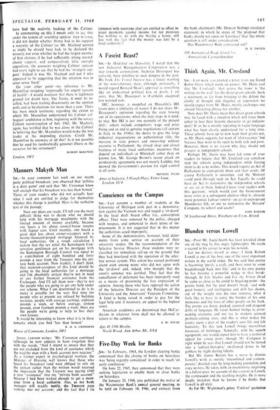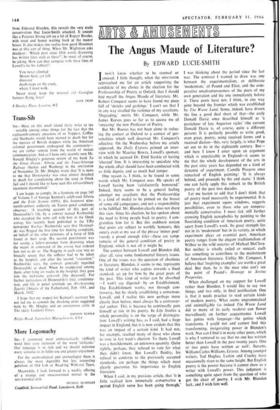Blunden versus Lowell
SIR,—Poor Mr. Lucie-Smith has been knocked clean out of the ring by five angry lightweights. He needs a second in his corner to wipe his wounds.
Let me declare myself at once: I think Robert Lowell is one of the best, one of the most important writers in the world today. He has said that poetry is becoming 'purely a craft, and there must be some breakthrough back into life.' and in his own poetry he has become a powerful wedge in that break- through. In Life Studies and For the Union Dead he came as close as he could to breaking-point—the poems bend, but the poet doesn't break—and with great honesty and intelligence and skill has shown, out of the insight into his own remorse, what it feels like to have to carry the burden of his own memories and the lives of other people on his back. The poems arc dense, packed, jammed and eloquent drills of language. He treats human beings as error- making creatures and not (as in modern science) problem-solving ones, and this is what makes his poetry seem a part of the reader's own life and felt humanity. To this task Lowell brings marvellous resources of technique. Naturally, with his superb equipment, one would expect him to have a technical appeal for young poets—though Mr. Conquest is right when he says that Lowell should not be turned into a 'culture-therapist,' swallowed down in fat gobbets by slight dieting talents.
But Mr. James Reeves has a nerve to dismiss Lowell's work as merely 'streamlined and contem- porary,' drooled over by king-making journalists and copy-writers. He takes, with an insensitivity surprising in a fellow-poet, no account of the content in Lowell, the compassion and the startling insights. He is more deeply mistaken than he knows if he thinks that Lowell is all style.
As for Mr. Wightman's prissy 'Cuckoo quotation from Edmund Blunden, this reveals the very static conservatism that Lucie-Smith attacked. It sounds like a Patience Strong job on a bit of Rupert Brooke, with toast and honey waiting back at the manor house. It also makes one realise how good Housman was at this sort of thing. When Mr. Wightman asks deadpan : 'Which poet since 1916 worth discussing has written lines such as these?', he must, of course, be joking. How can they compare with these lines of Lowell's (to his father)? : You never climbed
Mount Sion, yet left
dinosaur death-steps on the crust, where 1 must walk.
Never mind, keep the tattered old Georgian
banners flying, boys! JOILN TRIPP
8 Howley Place, London, W2



































 Previous page
Previous page